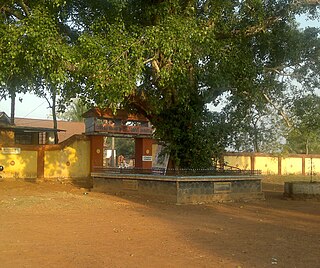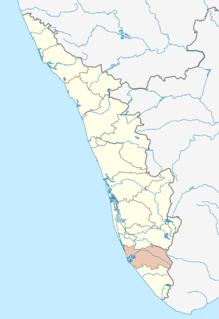
India, official name, the Republic of India,, is a country in South Asia. It is the seventh-largest country by area, the second-most populous country, and the most populous democracy in the world. Bounded by the Indian Ocean on the south, the Arabian Sea on the southwest, and the Bay of Bengal on the southeast, it shares land borders with Pakistan to the west; China, Nepal, and Bhutan to the north; and Bangladesh and Myanmar to the east. In the Indian Ocean, India is in the vicinity of Sri Lanka and the Maldives; its Andaman and Nicobar Islands share a maritime border with Thailand and Indonesia.

Karnataka is a state in the south western region of India. It was formed on 1 November 1956, with the passage of the States Reorganisation Act. Originally known as the State of Mysore, it was renamed Karnataka in 1973. The state corresponds to the Carnatic region. The capital and largest city is Bangalore.
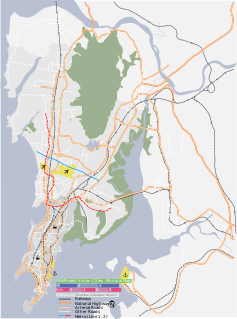
Mumbai is the capital city of the Indian state of Maharashtra. As of 2011 it is the most populous city in India with an estimated city proper population of 12.4 million. The larger Mumbai Metropolitan Region is the second-most-populous metropolitan area in India, with a population of 21.3 million as of 2016. Mumbai lies on the Konkan coast on the west coast of India and has a deep natural harbour. In 2008, Mumbai was named an alpha world city. It is also the wealthiest city in India, and has the highest number of millionaires and billionaires among all cities in India. Mumbai is home to three UNESCO World Heritage Sites: the Elephanta Caves, Chhatrapati Shivaji Maharaj Terminus, and the city's distinctive ensemble of Victorian and Art Deco buildings.

Thiruvananthapuram, commonly known by its former name Trivandrum, is the capital of the Indian state of Kerala. It is the most populous city in Kerala with a population of 957,730 as of 2011. The encompassing urban agglomeration population is around 1.68 million. Located on the west coast of India near the extreme south of the mainland, Thiruvananthapuram is a major Information Technology hub in Kerala and contributes 55% of the state's software exports as of 2016. Referred to by Mahatma Gandhi as the "Evergreen city of India", the city is characterised by its undulating terrain of low coastal hills.
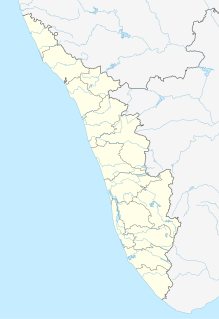
Kochi, also known as Cochin, is a major port city on the south-west coast of India bordering the Laccadive Sea. It is part of the district of Ernakulam in the state of Kerala and is often referred to as Ernakulam. Kochi is the most densely populated city in Kerala. As of 2011, it has a corporation limit population of 677,381 within an area of 94.88 km² and a total urban population of more than of 2.1 million within an area of 440 km², making it the largest and the most populous metropolitan area in Kerala. Kochi city is also part of the Greater Cochin region and is classified as a Tier-II city by the Government of India. The civic body that governs the city is the Kochi Municipal Corporation, which was constituted in the year 1967, and the statutory bodies that oversee its development are the Greater Cochin Development Authority (GCDA) and the Goshree Islands Development Authority (GIDA).
Education in India is provided by public schools and private schools. Under various articles of the Indian Constitution, free and compulsory education is provided as a fundamental right to children between the ages of 6 and 14. The approximate ratio of public schools to private schools in India is 7:5.
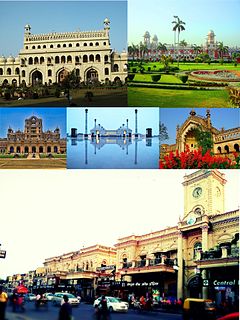
Lucknow is the capital city of the Indian state of Uttar Pradesh, and is also the administrative headquarters of the eponymous district and division. It is the eleventh most populous city and the twelfth most populous urban agglomeration of India. Lucknow has always been known as a multicultural city that flourished as a North Indian cultural and artistic hub, and the seat of power of Nawabs in the 18th and 19th centuries. It continues to be an important centre of governance, administration, education, commerce, aerospace, finance, pharmaceuticals, technology, design, culture, tourism, music and poetry.

University of Madras is a public state university in Chennai, Tamil Nadu, India. Established in 1857, it is one of the oldest universities in India. The university was incorporated by an act of the Legislative Council of India.
The Kendriya Vidyalaya Sangathan is a system of central government schools in India that are instituted under the aegis of the Ministry of Human Resource Development (MHRD). It has a total of 1209 schools in India.(as of July 2019) and three abroad. It is one of world's largest chains of schools.

The Midday Meal Scheme is a school meal programme of the Government of India designed to better the nutritional standing of school-age children nationwide. The programme supplies free lunches on working days for children in primary and upper primary classes in government, government aided, local body, Education Guarantee Scheme, and alternate innovative education centres, Madarsa and Maqtabs supported under Sarva Shiksha Abhiyan, and National Child Labour Project schools run by the ministry of labour. Serving 120,000,000 children in over 1,265,000 schools and Education Guarantee Scheme centres, it is the largest of its kind in the world.
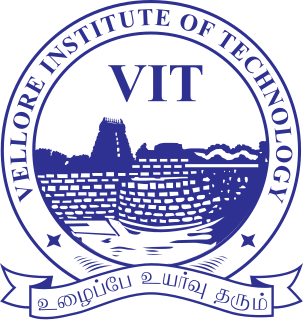
Vellore Institute of Technology (VIT) is a private deemed university and an Institute of Eminence located in the outskirts of Vellore, Tamil Nadu, India. Founded in 1984, as Vellore Engineering College, by G. Viswanathan, the institution offers 20 undergraduate, 34 postgraduate, four integrated and four research programs. It has campuses in Vellore, Chennai, Bhopal and Amaravati.
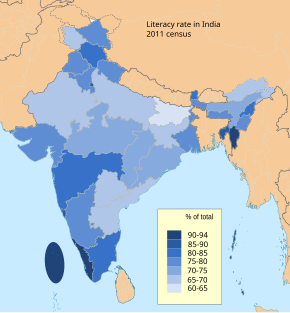
Literacy in India is a key for socio-economic progress, and the Indian literacy rate has grown to 74.04%. Despite government programmes, India's literacy rate increased only "sluggishly". The 2011 census, indicated a 2001–2011 decadal literacy growth of 9.2%, which is slower than the growth seen during the previous decade. An old 1990 study estimated that it would take until 2060 for India to achieve universal literacy at then-current rate of progress.
The Ministry of Human Resource Development, formerly Ministry of Education, is responsible for the development of human resources in India. The Ministry is held currently by Ramesh Pokhriyal and is divided into two departments: the Department of School Education and Literacy, which deals with primary, secondary and higher secondary education, adult education and literacy, and the Department of Higher Education, which deals with university education, technical education, scholarship etc. The erstwhile Ministry of Education now functions under these two departments, as of 26 September 1985.

Symbiosis International University, officially Symbiosis International , is a deemed to be university headquartered in Pune, Maharashtra, India. The university has 38 academic institutions spread over ten campuses in Pune, Bengaluru, Noida, Hyderabad, Nashik, and Nagpur. The university's School for Liberal Arts is a member of the Alliance of Asian Liberal Arts Universities (AALAU).

Lovely Professional University (LPU) is a private university situated in Phagwara, Punjab, India. The university was established in 2005 by Lovely International Trust, under The Lovely Professional University Act, 2005 and started operation in 2006. With 24,000 students in 2010, it claims to be the largest single-campus private university in India.
Jawahar Navodaya Vidyalayas (JNVs) is a system of alternate schools for gifted students in India. They are run by Navodaya Vidyalaya Samiti, New Delhi, an autonomous organization under the Department of School Education and Literacy, Ministry of Human Resource Development, Government of India. JNVs are fully residential and co-educational schools affiliated to Central Board of Secondary Education (CBSE), New Delhi, with classes from VI to XII standard. JNVs are specifically tasked with finding talented children in rural areas of India and providing them with an education equivalent to the best residential school system, without regard to their families' socio-economic condition.
The Right of Children to Free and Compulsory Education Act or Right to Education Act (RTE) is an Act of the Parliament of India enacted on 4 August 2009, which describes the modalities of the importance of free and compulsory education for children between the age of 6 to 14 years in India under Article 21A of the Indian Constitution. India became one of 135 countries to make education a fundamental right of every child when the act came into force on 1 April 2010. The title of the RTE Act incorporates the words ‘free and compulsory’. ‘Free education’ means that no child, other than a child who has been admitted by his or her parents to a school which is not supported by the appropriate Government, shall be liable to pay any kind of fee or charges or expenses which may prevent him or her from pursuing and completing elementary education. ‘Compulsory education’ casts an obligation on the appropriate Government and local authorities to provide and ensure admission, attendance and completion of elementary education by all children in the 6-14 age group. With this, India has moved forward to a rights based framework that casts a legal obligation on the Central and State Governments to implement this fundamental child right as enshrined in the Article 21A of the Constitution, in accordance with the provisions of the RTE Act.17.

The Central Board of Secondary Education (CBSE) is a national level board of education in India for public and private schools, controlled and managed by Union Government of India. CBSE has asked all schools affiliated to follow only NCERT curriculum. There are approximately 20,299 schools in India and 220 schools in 28 foreign countries affiliated to the CBSE.
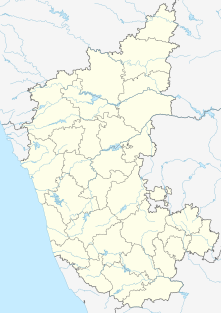
Bangalore, officially known as Bengaluru, is the capital of the Indian state of Karnataka. It has a population of over ten million, making it a megacity and the third-most populous city and fifth-most populous urban agglomeration in India. It is located in southern India, on the Deccan Plateau at an elevation of over 900 m (3,000 ft) above sea level, which is the highest among India's major cities. Its multi-ethnic, multi-religious, and cosmopolitan character is reflected by its more than 1000 temples and Hindu mandirs, 400 Islamic mosques, 100 Christian churches, 40 Jain derasars, three Sikh gurdwaras, two Buddhist viharas and one Parsi fire temple located in an area of 741 km² of the metropolis. The religious places are further represented by the proposed Chabad of the Jewish community. The numerous Bahá'ís have a society called the Bahá'í Centre.

The Council for the Indian School Certificate Examinations (CISCE) is a privately held national-level board of school education in India that conducts the Indian Certificate of Secondary Education and the Indian School Certificate examinations for Class X and Class XII respectively. It was established in 1958. Over 2,100 schools in India and abroad are affiliated to the CISCE.
